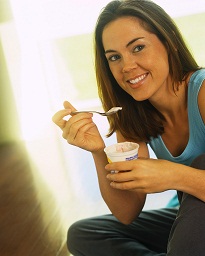Good Vaginal Bacteria
by Nancy
(San Mateo, CA)

Lactobacilli bacteria are found in yoghurt and a woman's vagina
When a baby is born vaginally what are the good bacteria and secretions it receives in the birth canal?
Answer
A healthy vagina is a self-sustaining ecosystem, largely colonized by a 'good' bacteria called lactobacilli, which are incidentally, the same bacteria found in yoghurt!
According to Dr Hillier from the Magee-Women's Hospital in Pittsburgh, "a healthy vagina is as clean and pure as a carton of yoghurt". (from Woman: An Intimate Geography by Natalie Angier)
by Natalie Angier)
Healthy vaginal discharge is not at all 'dirty' and does not contain any toxic substances as does urine and faeces. In fact, your vagina is also cleaner than your mouth!
Vaginal discharge mainly consists of water, albumin (a protein which is found in abundance in the body), mucin, the oily substance that lubricates the vagina and cervix and possibly a few stray white blood cells.
Research has shown that it is the mode or route of birth that determines which bacteria initially colonize a newborn baby's body and gut. This is significant because the type of bacteria which colonize first affects the development of an infant's digestive and immune systems and may affect the individual's health later.
The type of bacterial ecosystem that is established at birth affects how the body responds to 'unwelcome bacterial guests' later on.
Previous research indicates that infants born by cesarean are more prone to asthma, allergies and other immune system-related difficulties than babies born vaginally.
(See Risks of Cesarean)
A study published in 20101 showed that "vaginally delivered infants acquired bacterial communities resembling their own mother's vaginal microbiota, dominated by Lactobacillus, Prevotella, or Sneathia spp."
By contrast the babies born by c-section "harbored bacterial communities similar to those found on the skin surface, dominated by Staphylococcus, Corynebacterium, and Propionibacterium spp."
To add to the above, research has shown that placing a newborn baby on the mother's bare chest in skin-to-skin contact immediately after birth, also promotes colonization of the baby's body and gut with 'good' bacteria of the mother, in addition to a host of other benefits to both the mother and infant.
So, evidence-based research shows that nature's way has the most benefits, but if for any reason your baby is not birthed vaginally, insist that your baby is placed naked on your bare chest immediately after birth! It's your right and your baby's too.
References
1. Maria G. Dominguez-Belloa, Elizabeth K. Costellob, Monica Contrerasc,Magda Magrisd, Glida Hidalgod, Noah Fierere and Rob Knightb, Delivery mode shapes the acquisition and structure of the initial microbiota across multiple body habitats in newborns,
Department of Microbiology and Immunology, Stanford University School of Medicine, Stanford, CA 94305, http://www.pnas.org/content/107/26/11971
More Pages Related to the Vaginal Bacteria
Vaginal Birth
The Benefits of Vaginal Birth
Vaginal Birth Video Clips
VBAC - Vaginal Birth After Cesarean
Comments for Good Vaginal Bacteria
|
||
|
||
|
Back to Questions |
Disclaimer: All information is provided for informational purposes only, although every effort is made to provide accurate and current information.
The site content is not intended to be or to substitute for medical advice, diagnosis, or treatment.
Always seek the advice of a suitably qualified health care professional regarding your individual medical needs.
Pregnancy and Giving Birth.com is not responsible nor liable for any advice, course of treatment, diagnosis, services or products obtained via this website.
Return to Top
All Rights Reserved.

